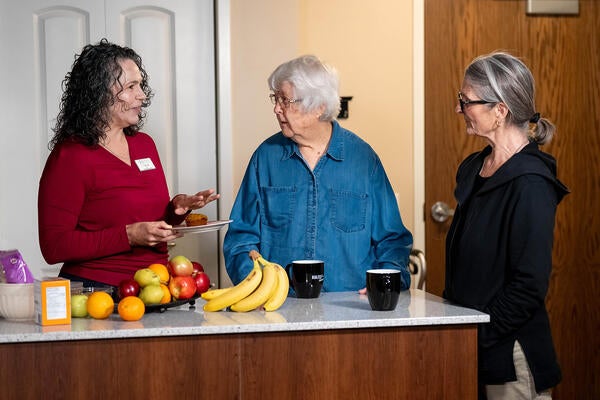
Survey will reduce rates of malnutrition in hospitals
University of Waterloo researchers have created a tool aimed at decreasing the rate of malnutrition in hospitals

University of Waterloo researchers have created a tool aimed at decreasing the rate of malnutrition in hospitals
By Media RelationsKnown as the Mealtime Audit Tool (MAT), it will help dietitians, doctors and nurses identify why a third of patients in acute care settings don’t eat the food on their trays.
“We know poor food intake is happening in hospitals, and until now we didn’t have a way of systematically understanding why,” said Heather Keller, a professor in the Faculty of Applied Health Sciences and a Schlegel Research Chair in Nutrition and Aging. “As malnutrition is a significant issue in hospitals, especially in surgical and medical units where long-term stays are not expected, nutrition is more difficult to monitor.”
The MAT is a 17-question survey designed to identify why an individual patient is not eating well and also provides information to improve unit-wide practices.
“With MAT, clinicians should be able to identify and solve nutrition issues at both the individual and the unit level,” said Professor Keller.
Common barriers to food intake that MAT could help identify for individual patients as well as whole hospital units include: inconvenient meal times, hot foods arriving cold, dissatisfaction with food quality, interruptions during meals, unpleasant odours and distracting eating environments.
The nutritional status of about 20 per cent of patients deteriorates during a hospital stay. It can lead to longer hospital stays.
“Even patients who enter the hospital in good health are at risk for malnutrition,” said Professor Keller. “By ensuring patients are getting the nutrition they need, we are not only expediting their recovery, but ensuring that complications due to poor food and fluid intake, like delirium and falls, do not occur while in hospital.”
The next phase of MAT development will include an app to administer the survey and software to track and analyze responses.
Keller’s research recently appeared in the Journal of Nutrition Health and Aging.

Read more
The Government of Canada announces funding to support research in food policies and medical devices

Read more
How machine learning empowers collaboration between computer science, math and medical research

Read more
Dr. Heather Keller discusses the need to transform mealtimes in Canada’s long-term care homes from a service to a meaningful form of care
The University of Waterloo acknowledges that much of our work takes place on the traditional territory of the Neutral, Anishinaabeg, and Haudenosaunee peoples. Our main campus is situated on the Haldimand Tract, the land granted to the Six Nations that includes six miles on each side of the Grand River. Our active work toward reconciliation takes place across our campuses through research, learning, teaching, and community building, and is co-ordinated within the Office of Indigenous Relations.